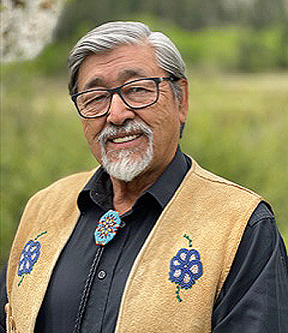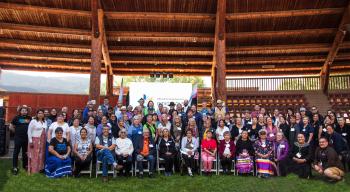Image Caption
Summary
Local Journalism Initiative Reporter
Windspeaker.com
Updated Oct. 23 at 5:04 p.m. (Alberta).
There is “much that needs to be improved” in the Indigenous Languages Act, says Ronald E. Ignace, but the federal legislation provides a starting point.
“One of the things in the co-development of the act, one of the things that we wanted to ensure, is that the act be like a living agreement, that it will grow with us through time,” said Ignace.

He was appointed in 2021 as Canada’s first commissioner of the Office of the Commissioner of Indigenous Languages (OCIL). His appointment came two years after the Indigenous Languages Act was passed. And only this past June was the commission’s head office officially opened in Ottawa.
The legislation recognizes the “rights of Indigenous peoples related to Indigenous laws,” but its power comes in the implementation process, says Ignace.
“What will bring back our languages is what Indigenous people, leaders and Canada do with that legislation. That will lead to transformative change to our languages. That will give voice to our traditions, customs and laws on the land,” he said.
Ignace is clear that it is not the role of the commissioner’s office to determine how the act will grow and change. His office will ensure that the Heritage minister, under whose department the legislation falls, consults with Indigenous people, who will “define what the needs are going forward (and) the commission will be there to support them in that endeavour.”
And among those needs is adequate, sustainable, and long-term funding. Indigenous languages programs are currently funded by proposals on an annual basis.
At the first national meeting hosted by the commission in September on the traditional territory of the Tk'emlúps te Secwépemc, Ignace heard what he’s been hearing for years: Funding has to change.
It was the same message he received in his previous positions as chair of the Ministerial Task Force on Aboriginal Languages and Cultures (2003-2005).
In 2016 to 2021, Ignace served as advisor to then Assembly of First Nations National Chief Perry Bellegarde on Indigenous languages and 'co-development' to make sure Métis and Inuit were well engaged as co-partners in the language legislation.
And the difference now, he says, is that there is legislation.
Legislation commits the government to go to Treasury Board and begin to be engaged in the resourcing of Indigenous languages.
“Up until then it's (been) up to the goodwill of the government,” said Ignace.
However, he admits, legislation that urges funding doesn’t solve the issue entirely as the government battles “huge deficits” because of economic stimulation during the coronavirus pandemic.
“I’m always hopeful that the government will recognize that if they are to achieve reconciliation that they have to invest in our languages and in the revitalization of our languages, because our language is tied to the land and it is important to our life,” said Ignace.
On top of that, he says in his OCIL 2021-2022 inaugural annual report, the legislation lacks a definition for “adequate” funding.
“To assess what is adequate, the objectives of the funding must be clearly defined,” he wrote.
Despite 20-plus years of anecdotal knowledge regarding the lack of funding, OCIL is undertaking a review of the adequacy of resources for language revitalization.
OCIL is also undertaking a research project to determine the vitality of Indigenous languages across the country.
Ignace says that while Statistics Canada provides some information, the government agency doesn’t have a “clear understanding about Indigenous languages” and collection methodology has resulted in “major gaps and flaws.”
Statistics Canada 2016 census points to declining growth and the aging of those who claim Indigenous languages as their mother tongue. However, at the same time, second-language acquisition among younger speakers is increasingly sustaining the growth of Indigenous language speakers.
“How can we… get a better understanding of the vitality of languages across Canada? Canada is a big country. We have many languages and great diversity. So it's a complex question that will not be quite readily resolved,” said Ignace.
Ignace says the commission is pushing for a whole-of-government approach to language revitalization and not solely rely on work to be undertaken by Canadian Heritage.
“All departments, government agencies and entities must engage in the language because it took 150 years with the combined weight of the church and state to get our languages in the state that they're in today. It's going to take a grand effort to reverse this…and move us towards realization of where we have our languages being heard across the country,” he said.
In OCIL’s recently released 2022-2023 annual report, Ignace notes that 15 key federal departments, agencies and entities were asked by the commission how they intended to contribute to the revitalization and use of Indigenous languages. Ten responses were received and indicated that some respondents “may be grappling with understanding their respective obligations and the role their organization can play in the implementation of the act,” wrote Ignace.
The commissioner says he has hope for the revitalization of Indigenous languages.
Ignace was raised by his great grandmother Sulyen Eneas and taught to speak Secwepemctsin. When he was ready to leave his community, she told him to learn all he could and then return home. He was called back by the Elders in 1982 to become chief of the Skeetchestn Indian Band and they told him to fight for their language.
“And I never waivered on that. And I fought for all my years and was engaged in and party to and stood and fought alongside many great language warriors and learned from them,” said Ignace.
He says groundbreaking work that is being done in Indigenous language communities shows him that “given the right resources, foundational support that's permanently sustained, we will, in the end, bring the vitality back into our languages.”
To read the 2022/23 annual report go to https://commissionforindigenouslanguages.ca/wp-content/uploads/2023/10/…
Windspeaker is owned and operated by the Aboriginal Multi-Media Society of Alberta, an independent, not-for-profit communications organization.
Each year, Windspeaker.com publishes hundreds of free articles focused on Indigenous peoples, their issues and concerns, and the work they are undertaking to build a better future.
If you support objective, mature and balanced coverage of news relevant to Indigenous peoples, please consider supporting our work. Whatever the amount, it helps keep us going.

